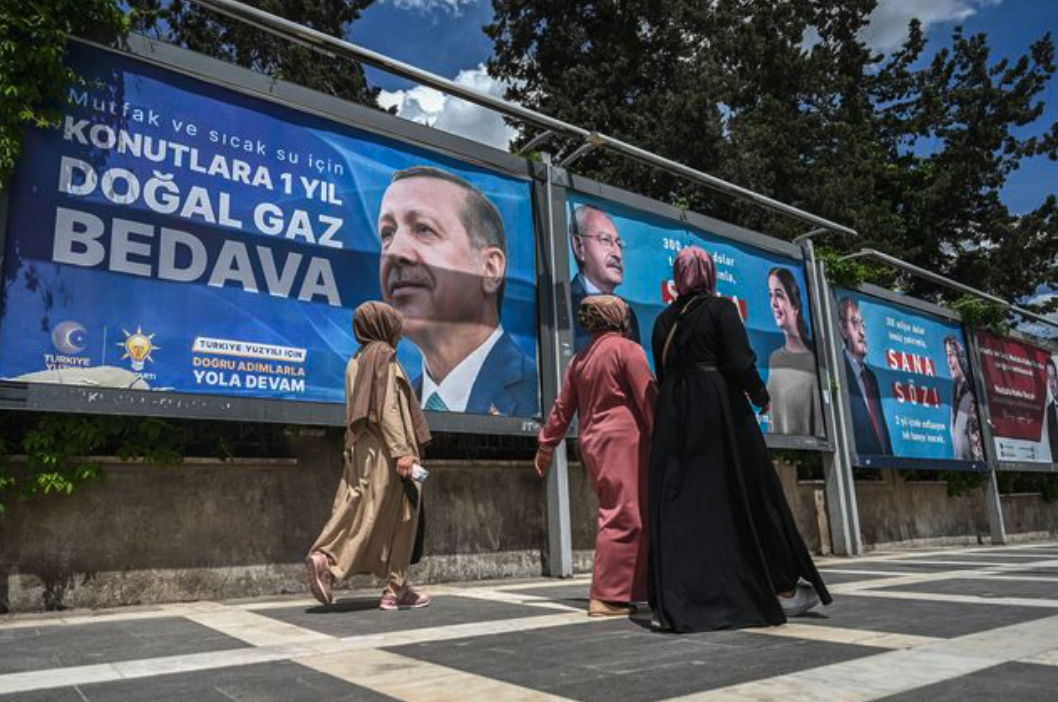Turkey’s elections look set to be defining not only for the country, and its economy and politics but also for the region and broader geopolitics. By Timothy Ash in Barrons.com, May 10, 2023.
Turkey will hold presidential and parliamentary elections on May 14. President Recep Tayyip Erdogan and the six-party opposition coalition are offering very different visions for the economy. The outcome of this election could leave very different impacts on the markets and economy.
Erdogan has been in power for more than 20 years, first as prime minister, and since 2014 as president. In this cycle, he is offering more of the same unorthodox monetary policies that, for the past decade, have created stop-go economic cycles with almost constant selling pressure on the lira and consequently persistently high inflation (more than 40% at present). Erdogan has demanded rate cuts even as inflation spiked, and the central bank has delivered. His seemingly faith-based aversion to interest rate hikes means that he has had to resort to distortionary macro prudential policies, including capital- and market-control mechanisms to defend the lira and fight inflation. All this has undermined the business environment and seen foreign investors exit, hurting productivity and long-term growth.
Turkey has limited foreign-exchange buffers. Its international reserve position is negative, accounting for swaps. Continuation of Erdogan’s macroeconomic policies beyond the election risks a more systemic crisis and a crisis of confidence in the lira and the country’s banks.
The opposition, in contrast, is promising a return to economic policy orthodoxy with policy rate normalization and a flexible exchange rate. Kemal Kilicdaroglu is the presidential candidate for a coalition of parties that have united to unseat Erdogan. The coalition has offered to dismantle Erdogan’s web of market distorting economic policies, clean up state institutions such as the Central Bank of the Republic of Turkey, and open the country back up to foreign investment.
Were the opposition to win, growth would have to slow in the short term to weigh down on inflation, to reduce the large current account deficit (roughly 6% of GDP) and close the country’s large external financing gap (more than $230 billion). But the prospect of more sustainable growth could renew foreign investor interest in the country. Under Erdogan the stock of foreign portfolio investment in the country has shrunk from a peak of just over $130 billion a decade ago to less than $30 billion at present. Much of this could return with a return to monetary policy orthodoxy. These inflows would help to stabilize the lira, which would anchor inflation lower and ultimately allow policy rate cuts to then spur growth.
The elections are also likely to be a vote on the country’s broader direction of travel.
Turkey has shifted under Erdogan from a from Western liberal democracy, to a more authoritarian, centralized, almost Central Asian model. Will that direction continue, to see power concentrated around Erdogan’s family? Or is Turkey heading to a different political model? The opposition is promising a return to a more pluralistic model, with the power of the presidency reduced and a return to a more parliamentary-dominated system with checks and balances, eroded over the past decade, re-introduced.
This election is also about Turkey’s geopolitical orientation.
Erdogan has pulled Turkey east, away from its traditional Western allies in the European Union and NATO. He has looked for new allies, and sources of financing, among authoritarian regimes in Russia and the Gulf. Erdogan has found political advantage in the provision of foreign exchange swaps for the Central Bank of the Republic of Turkey, deposits at the central bank, financing from Russia for Turkey’s nuclear power program, and large unexplained errors and omission inflows on the balance of payments.
Erdogan has also sought to play the West off against Russia in the war in Ukraine. Finland and Sweden both formally applied for NATO membership last year. Erdogan has used the NATO enlargement issue for political support at home, by playing hardball over Finland and Sweden’s NATO bid. Being tough on the West plays well with the nationalist constituency at home.
Arguably the West has resisted holding Erdogan to account before the elections, in order to avoid giving his national constituency an electoral advantage. But after the elections, the West will likely push Turkey to decide where it sits in the now-hegemonic battle between the U.S., and its allies in liberal market democracies, and China and Russia, and the authoritarian axis of powers.
The opposition have made clear that if it wins the election, Turkey will pivot back West, while still maintaining a degree of independence on issues of national interest, including the Mediterranean, Syria, and the Kurdish issue. But expect relations with Russia to cool. In response, if the opposition wins, it is likely the EU will offer a new and better customs deal as part of a push by the West to re-engage with Turkey. The warmer relationship with the West will also bring a new flood of Western financing, and portfolio and direct investment. Turkey should then benefit from its advantages to the West in terms of “near-shoring” of supply chains.
In the event of another Erdogan victory, it is likely that the West will heap pressure on Turkey to decide between the West and the authoritarian axis. Sanctions are possible. Ultimately, even Erdogan will realize that the Western alliance provides the best security assurance for Turkey and I expect compromises over the issue of Sweden’s NATO accession bid. But relations between the West and another Erdogan administration would remain difficult, and would constrain much-needed investment flows from the West. This would just add to Erdogan’s woes on the economic front, making a systemic crisis more likely.
Timothy Ash is the emerging markets senior sovereign strategist at BlueBay Asset Management.

